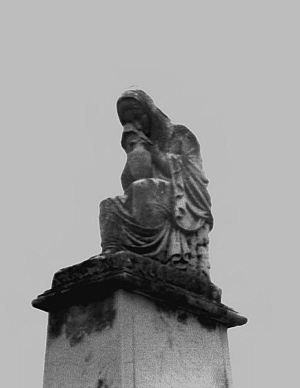 I am home alone—sort of. I am almost twelve, and I am unsupervised. My parents have gone shopping. My brother is at a friend’s. It’s just me and my grandparents, who live in an apartment attached to our house.
I am home alone—sort of. I am almost twelve, and I am unsupervised. My parents have gone shopping. My brother is at a friend’s. It’s just me and my grandparents, who live in an apartment attached to our house.
My grandfather is sick. He has been for a year. For a few weeks now he has hardly eaten, and for a few days he has been unable to blink, so my grandmother applies tears to his eyes.
On this day I am not thinking of his sickness. I am writing a fantasy novel called The Tempest. (I have heard this name somewhere but have not yet read Shakespeare, do not realize that this name is taken.) My Tempest is about an evil wizard who steals horses from girls who are lucky enough to own them in the first place.
Someone knocks at the door while I am writing, and I answer it. It is a man with a clipboard. He is wearing a bicycle helmet. When he speaks I know he is retarded. I can’t understand him, but I know I must try. My mother is an occupational therapist who works with retarded people and she has made this clear to me. He wants me to sign something on his clipboard. He is saying something about Carl Sagan and Russia and exploring space, something about weapons and the Cold War, (which will end within the year, though we don’t know that yet.) I can tell that he is reciting a script and I wonder if he is leaving things out, because the words make sense but the sentences do not. Finally I tell him, “No thanks,” and I shut the door, wondering what happened. I want to tell someone, so I go down the half-flight of stairs to my grandparents’ apartment.
My grandmother is just standing there.
“You should have seen the guy,” I tell her, and she shushes me.
“He’s dead,” she says, and we stare at each other for a moment.
“Can I see him?” I say.
She leads me into the bedroom, and there he is, blood on the pillow next to his mouth. He has shrunken so much that his limbs no longer fill out the leg holes of his underpants, and they sag, revealing too much. I look at his face, and I wonder if he closed his own eyes or if my grandmother did it for him. I wonder if she was with him when he died.
She pulls me into the hallway.
“The coroner is coming. So is your uncle,” she says. (My parents will not own cell phones for another ten years, so we cannot call them to come too.) We wait. I go upstairs to wait by the dining room window. Years later, I will wonder why I left her to wait alone.
The coroner arrives first, then my uncle, but I do not move from the window. I do not see what happens in the bedroom, but I see what they carry back out to the van.
My parents arrive after the coroner has gone, and I go out to tell my mother what has happened. I can’t speak. I stand in front of her on the driveway and she sees it in my face. She pulls me into her arms and starts to cry.
I do not cry yet. At the funeral I will cry because the minister will not have drawn her lipstick on within the arcs that define her lips, making a mess of her face, and I will cry because my cousins will laugh at her. Perhaps it is funny, but I will cry anyway because I will want meaning in a world that seems absurd.
Now that my mother knows her father is dead, I want to tell her about the retarded man, too. I know she won’t care now, but I can’t stop thinking about him. I imagine that he was the angel of death, from a star within the constellation of Cancer. He was a crab creature disguised as a person, still learning to form words with his human mouth, which was why his speech sounded funny. He didn’t know who Carl Sagan was any more than I did; it was just something he heard in a transmission that he picked up in space. There was no scythe and cloak, but he was the angel of death. I opened the door and let him in.
—
Laura Sewell Matter is a high school teacher in Albuquerque, New Mexico. Her work has appeared in The Georgia Review and The Best Creative Nonfiction Vol. 2 , and is forthcoming in Aethlon: The Journal of Sports Literature. Any day now, she will complete her MFA at the University of New Mexico.
photo by Kristin Fouquet
